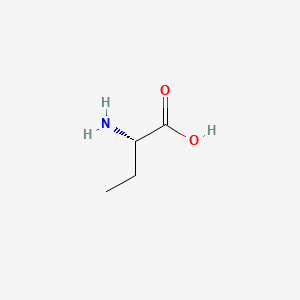| MeSH term | MeSH ID | Detail |
|---|---|---|
| Diabetes Mellitus | D003920 | 90 associated lipids |
| Glioma | D005910 | 112 associated lipids |
| Alcoholism | D000437 | 27 associated lipids |
| Liver Diseases, Alcoholic | D008108 | 13 associated lipids |
| Alcohol-Induced Disorders | D020751 | 1 associated lipids |
L-2-aminobutyric acid
L-2-aminobutyric acid is a lipid of Fatty Acyls (FA) class. The involved functions are known as Analyte, Noise and drug catabolism. The associated genes with L-2-aminobutyric acid are butyrine.
Cross Reference
Introduction
To understand associated biological information of L-2-aminobutyric acid, we collected biological information of abnormalities, associated pathways, cellular/molecular locations, biological functions, related genes/proteins, lipids and common seen animal/experimental models with organized paragraphs from literatures.
What diseases are associated with L-2-aminobutyric acid?
There are no associated biomedical information in the current reference collection.
Possible diseases from mapped MeSH terms on references
We collected disease MeSH terms mapped to the references associated with L-2-aminobutyric acid
PubChem Associated disorders and diseases
What pathways are associated with L-2-aminobutyric acid
There are no associated biomedical information in the current reference collection.
PubChem Biomolecular Interactions and Pathways
Link to PubChem Biomolecular Interactions and PathwaysWhat cellular locations are associated with L-2-aminobutyric acid?
There are no associated biomedical information in the current reference collection.
What functions are associated with L-2-aminobutyric acid?
Related references are published most in these journals:
| Function | Cross reference | Weighted score | Related literatures |
|---|
What lipids are associated with L-2-aminobutyric acid?
There are no associated biomedical information in the current reference collection.
What genes are associated with L-2-aminobutyric acid?
Related references are published most in these journals:
| Gene | Cross reference | Weighted score | Related literatures |
|---|
What common seen animal models are associated with L-2-aminobutyric acid?
There are no associated biomedical information in the current reference collection.
NCBI Entrez Crosslinks
All references with L-2-aminobutyric acid
Download all related citations| Authors | Title | Published | Journal | PubMed Link |
|---|---|---|---|---|
| Antoni G and Långström B | Asymmetric synthesis of L-2-amino[3-11C]butyric acid, L-[3-11C]norvaline and L-[3-11C]valine. | 1987 | Acta Chem. Scand., B, Org. Chem. Biochem. | pmid:3434082 |
| Vriesendorp FJ et al. | Concurrent measurements of blood flow and transcapillary transport in xenotransplanted human gliomas in immunosuppressed rats. | 1987 | J. Natl. Cancer Inst. | pmid:3474439 |
| Hasselgren PO et al. | Effect of insulin on amino acid uptake and protein turnover in skeletal muscle from septic rats. Evidence for insulin resistance of protein breakdown. | 1987 | Arch Surg | pmid:3545143 |
| Spielman J et al. | Temporal aspects of O-glycosylation and cell surface expression of ascites sialoglycoprotein-1, the major cell surface sialomucin of 13762 mammary ascites tumor cells. | 1987 | J. Biol. Chem. | pmid:3098740 |
| Constantoulakis P et al. | alpha-Amino-N-butyric acid stimulates fetal hemoglobin in the adult. | 1988 | Blood | pmid:2461755 |
| Shields H et al. | An ESR study of the radicals in X-irradiated L-alpha-amino-n-butyric acid HCl containing 1.5% L-cysteine HCl. | 1988 | Radiat. Res. | pmid:2849778 |
| Tews JK et al. | Induction of conditioned taste aversion in rats by GABA or other amino acids. | 1988 | Physiol. Behav. | pmid:3413234 |
| Shattuck MD et al. | An ESR study of radical kinetics in L-alpha-amino-n-butyric acid hydrochloride containing L-cysteine hydrochloride. | 1989 | Radiat. Res. | pmid:2556732 |
| Shiba K et al. | Analogues of alpha-aminoisobutyric acid with various alkyl groups as potential tumour imaging agents; effects of chain length on tumour and normal tissue specificity. | 1989 | Nucl Med Commun | pmid:2616099 |
| Zilberstein M et al. | Expression of insulin-like growth factor-I and its receptor by SV40-transformed rat granulosa cells. | 1989 | Mol. Endocrinol. | pmid:2481820 |
